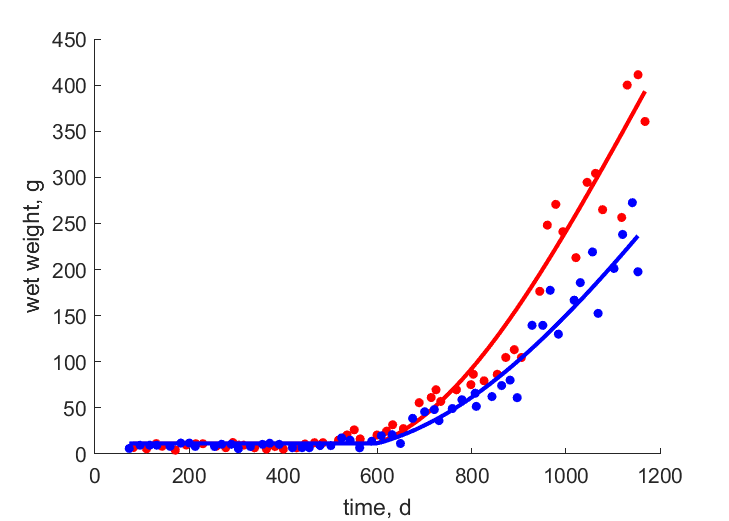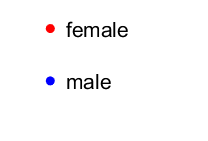Predictions & Data for this entry
| Model: std | climate: Cfa, Dfa | migrate: | phylum: |
| COMPLETE = 2.5 | ecozone: THn | food: biCi, biCvf | class: |
| MRE = 0.075 | habitat: biMm | gender: Dtmf | order: |
| SMSE = 0.021 | embryo: Tt | reprod: O | family: |
Zero-variate data
| Data | Observed | Predicted | (RE) | Unit | Description | Reference |
|---|---|---|---|---|---|---|
| ab_26 | 81 | 83.65 | (0.03275) | d | age at birth | RoosKell1996 |
| ab_32 | 47 | 49.44 | (0.05202) | d | age at birth | RoosKell1996 |
| ap | 2555 | 2316 | (0.09347) | d | age at puberty for female | ADW |
| am | 1.46e+04 | 1.459e+04 | (0.0004112) | d | life span | AnAge |
| Wwb | 10.4 | 10.53 | (0.01286) | g | wet weight at birth | RoosKell1996 |
| Wwi | 720 | 686.9 | (0.04593) | g | ultimate wet weight | ADW |
| Wwim | 650 | 683.8 | (0.05204) | g | ultimate wet weight for males | guess |
| Ri | 0.03288 | 0.03158 | (0.0395) | #/d | maximum reprod rate | ADW |
Uni- and bivariate data
| Data | Figure | Independent variable | Dependent variable | (RE) | Reference |
|---|---|---|---|---|---|
| tWw_f |   | time | wet weight | (0.217) | RoosKell1996 |
| tWw_m |   | time | wet weight | (0.1817) | RoosKell1996 |
Pseudo-data at Tref = 20°C
| Data | Generalised animal | Malaclemys terrapin | Unit | Description |
|---|---|---|---|---|
| v | 0.02 | 0.03841 | cm/d | energy conductance |
| p_M | 18 | 41.53 | J/d.cm^3 | vol-spec som maint |
| k_J | 0.002 | 0.00108 | 1/d | maturity maint rate coefficient |
| k | 0.3 | 0.2038 | - | maintenance ratio |
| kap | 0.8 | 0.4138 | - | allocation fraction to soma |
| kap_G | 0.8 | 0.8011 | - | growth efficiency |
| kap_R | 0.95 | 0.95 | - | reproduction efficiency |
Discussion
- Males are supposed to differ from females by {p_Am} only
- In view of low somatic maintenance, pseudodata k_J = 0.002 1/d is replaced by pseudodata k = 0.3
- A delay in the onset of growth had to be incorporated to match the tWw data
- mod_1: males have equal state variables at b, compared to females
Facts
- If eggs develop below 26 C males hatch, above 32 C females (Ref: ADW)
- Males are smaller than females and reach puberty earlier (Ref: RoosKell1996)
Bibliography